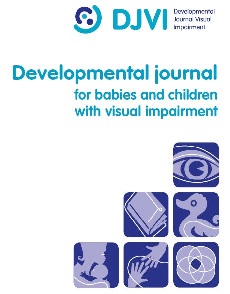Test Alert
British Summer is started !
Early Years is for babies and children from birth to 5 years old. Here are some examples of the support we offer to this age group:
There are 4 areas that are the basis for the EYFS framework. We aim to follow and support these very important principles:
After a request is made for our support, we will talk with you about your baby/child’s diagnosed vision impairment. It is important that we learn as much as we can about your child’s developmental journey so far. Our trained Qualified Teachers of Vision Impairment (QTVIs) will explain the support we can offer.
Request a referral with the Vision Support Service
We use the Developmental Journal for babies and children with vision impairment (DJVI) which is an internationally recognised, early intervention programme developed by Great Ormond Street Hospital Developmental Vision team.

This helps us build up a full understanding of your child's vision and needs. It means we can support parents with activities that are designed to improve outcomes and help your child reach early learning goals.
Children and babies with a vision impairment will develop in much the same way as other children, although there may be differences in the speed and order in which skills develop.
The difficulties some children and babies have with a vision impairment are not always obvious.
Different eye conditions create different ways of seeing:
Different vision conditions have a variety of effects with different implications for each child. It’s important to remember that your child is unique and that other children with the same eye condition may appear to see or can use their vision in a different way.
The play needs of a baby or child who is blind or vision impaired are essentially the same as those of a fully sighted child and follow the same developmental pattern, even where development is delayed.
Toys do not have to be expensive or specifically purchased for children with a vision impairment. We try to avoid toys made from plastic as many plastic objects are similar in many ways. They are often all smooth, with little or no variety in texture and have no smell or taste.
Almost everyone will use plastic objects in their everyday lives. A baby or child gains experience of these objects for example, from handling bottles, cups, toys, a toothbrush and rattles. By offering a whole range of objects, which are not plastic, we increase the opportunities for a child to explore and learn.
Each child or baby develops in their own unique way. Some children with a vision impairment may play with language rather than objects and use role-play.
Babies and children with a vision impairment will depend on their ability to use other senses such as their listening skills. They may need extra help to develop these skills efficiently by:
Young children and babies love music and rhythmic motion. Play music and use gentle movements with your child, bounce and sway them on your knee which will encourage them to listen to the rhythm. Choose a variety of shapes and materials that produce different sounds. These offer instant reward for effort and their entertainment value for a child is immense.
It is important to offer as wide a range of tactile and sensory experiences as possible right from the beginning. We try to encourage babies and children with vision impairment to play with and explore toys and objects with a variety of shapes, textures, weight and colour.
Touch is not just confined to hands. From the beginning babies learn through touch and enjoy close handling, such as rough and tumble, tickling and blowing raspberries, which help them become aware of their whole body movements and to learn to tolerate different positions, such as being placed on their stomach. If they are slow to roll or crawl, brightly-lit and sound-producing toys will provide motivation, reinforced by an encouraging voice.
Through sensory play we can demonstrate or offer suggestions to help your baby or child learn to use their vision. A child learns about their body, the environment they are in and other people by having direct experiences. Also using their senses by looking, listening, tasting, moving, feeling and making sounds or words. Through play we can bring or suggest sensory based activities and games that help babies/children explore. In doing this your baby or child can develop their experience of:
moving their eyes, head, hands, feet and body
fixing or focussing on an object
fixing or focussing on an object and following its movement
looking at and touching objects
understanding how to make something happen again - through curiosity and having fun